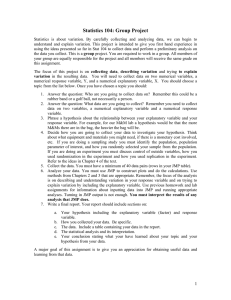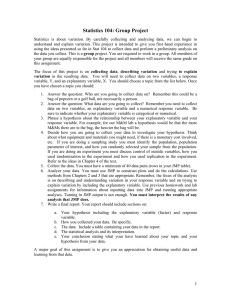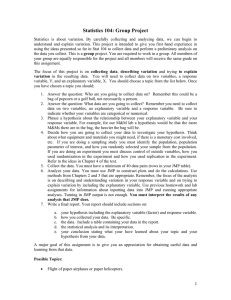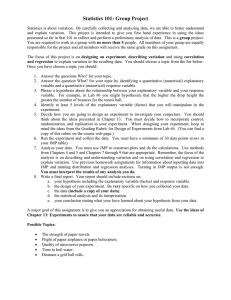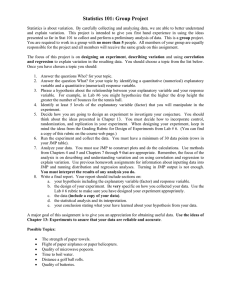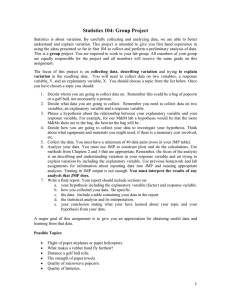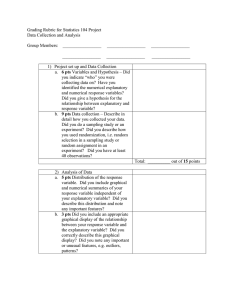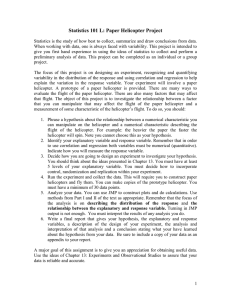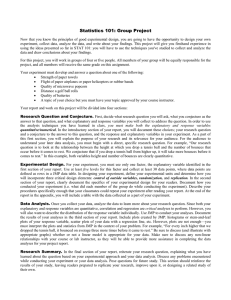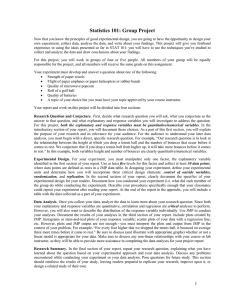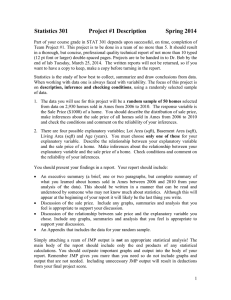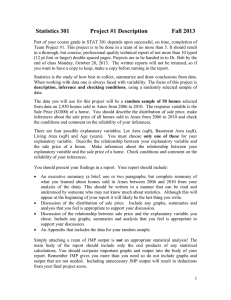Statistics 104: Group Project
advertisement
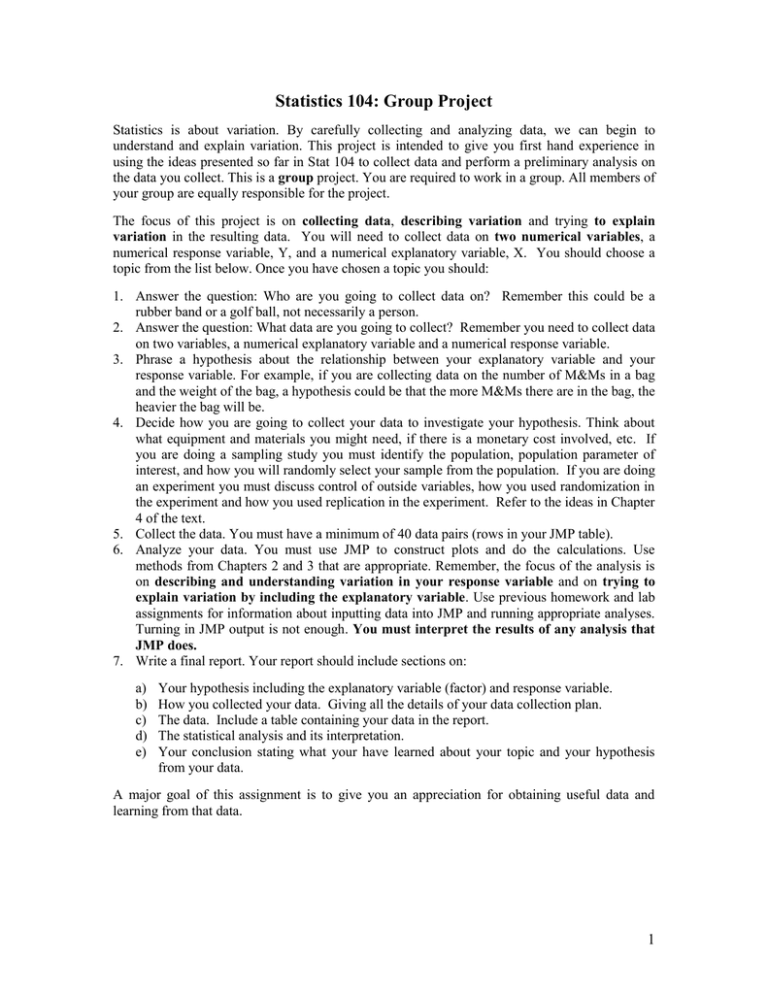
Statistics 104: Group Project Statistics is about variation. By carefully collecting and analyzing data, we can begin to understand and explain variation. This project is intended to give you first hand experience in using the ideas presented so far in Stat 104 to collect data and perform a preliminary analysis on the data you collect. This is a group project. You are required to work in a group. All members of your group are equally responsible for the project. The focus of this project is on collecting data, describing variation and trying to explain variation in the resulting data. You will need to collect data on two numerical variables, a numerical response variable, Y, and a numerical explanatory variable, X. You should choose a topic from the list below. Once you have chosen a topic you should: 1. Answer the question: Who are you going to collect data on? Remember this could be a rubber band or a golf ball, not necessarily a person. 2. Answer the question: What data are you going to collect? Remember you need to collect data on two variables, a numerical explanatory variable and a numerical response variable. 3. Phrase a hypothesis about the relationship between your explanatory variable and your response variable. For example, if you are collecting data on the number of M&Ms in a bag and the weight of the bag, a hypothesis could be that the more M&Ms there are in the bag, the heavier the bag will be. 4. Decide how you are going to collect your data to investigate your hypothesis. Think about what equipment and materials you might need, if there is a monetary cost involved, etc. If you are doing a sampling study you must identify the population, population parameter of interest, and how you will randomly select your sample from the population. If you are doing an experiment you must discuss control of outside variables, how you used randomization in the experiment and how you used replication in the experiment. Refer to the ideas in Chapter 4 of the text. 5. Collect the data. You must have a minimum of 40 data pairs (rows in your JMP table). 6. Analyze your data. You must use JMP to construct plots and do the calculations. Use methods from Chapters 2 and 3 that are appropriate. Remember, the focus of the analysis is on describing and understanding variation in your response variable and on trying to explain variation by including the explanatory variable. Use previous homework and lab assignments for information about inputting data into JMP and running appropriate analyses. Turning in JMP output is not enough. You must interpret the results of any analysis that JMP does. 7. Write a final report. Your report should include sections on: a) b) c) d) e) Your hypothesis including the explanatory variable (factor) and response variable. How you collected your data. Giving all the details of your data collection plan. The data. Include a table containing your data in the report. The statistical analysis and its interpretation. Your conclusion stating what your have learned about your topic and your hypothesis from your data. A major goal of this assignment is to give you an appreciation for obtaining useful data and learning from that data. 1 Possible Topics: Flight of paper airplanes or paper helicopters. Flight of rubber bands. Roll of a golf ball. Strength of tissues or toilet paper. A topic of your choice but you must have your topic approved by your course instructor. Grades will be determined on: 1. Explanation of your topic, hypothesis and how you collected your data [15 pts] 2. Relevance and completeness of the analysis of the data including appropriateness of your conclusions. [20 pts] 3. Quality of the final report. [5 pts] 4. Adherence to guidelines and deadlines provided in this handout and any oral instructions given in class. [5 pts] 5. Evaluation by other group members. [5 pts] Time table: You may submit work anytime on or before the listed dates. Submissions after the dates listed below will result in deductions from your project score. The end of lab period October 10 or 11: Each group should turn in a sheet of paper with names of the group members and the topic chosen. Also, on this sheet answer the questions: Who are you going to collect data on? and What data are you going to collect? Identify the numerical explanatory and numerical response variables. Formulate a hypothesis about the relationship between the explanatory and response variables. The end of lab period on October 17 or 18: Groups should turn in a detailed description of how they will collect their data. This description must clearly indicate how randomization will be used in the collection of the data. The end of lab period on October 31 or November 1: Data collection completed. A copy of the data must be submitted and no changes to the data can be made after submission. Data must be submitted by attaching a JMP data table as an attachment to an email to your course instructor. You will NOT get this copy back so make sure you have a copy for your group. In this email you should also indicate how you intend to analyze the data, i.e. indicate what sorts of graphs, and summary statistics you are going to look at. The end of lab period on November 14 or 15: Final report due. Submit only one report per group. Reports will NOT be returned. Each group member will receive a critique of the project and a project score. Evaluate your group members. You will evaluate all the members in your group, including yourself, by filling out a survey on Blackboard. Guidelines: Work submitted for this project must follow the guidelines below. Failure to follow these guidelines will result in deductions from your project score. All work submitted for this project must include the names of all group members. Final reports must be printed using either an ink-jet or laser printer. The final report must be written like a term paper. The report should contain sections, paragraphs, complete sentences, and NO misspelled words. You should divide your report into sections, making sure to clearly label these sections. All graphs and plots must be computer generated. Hand-drawn plots or graphs will not be accepted. Use the information from homework #3 and #4 to create graphs and analyses using the computer program JMP. You can COPY/PASTE JMP output into a Word file. 2
